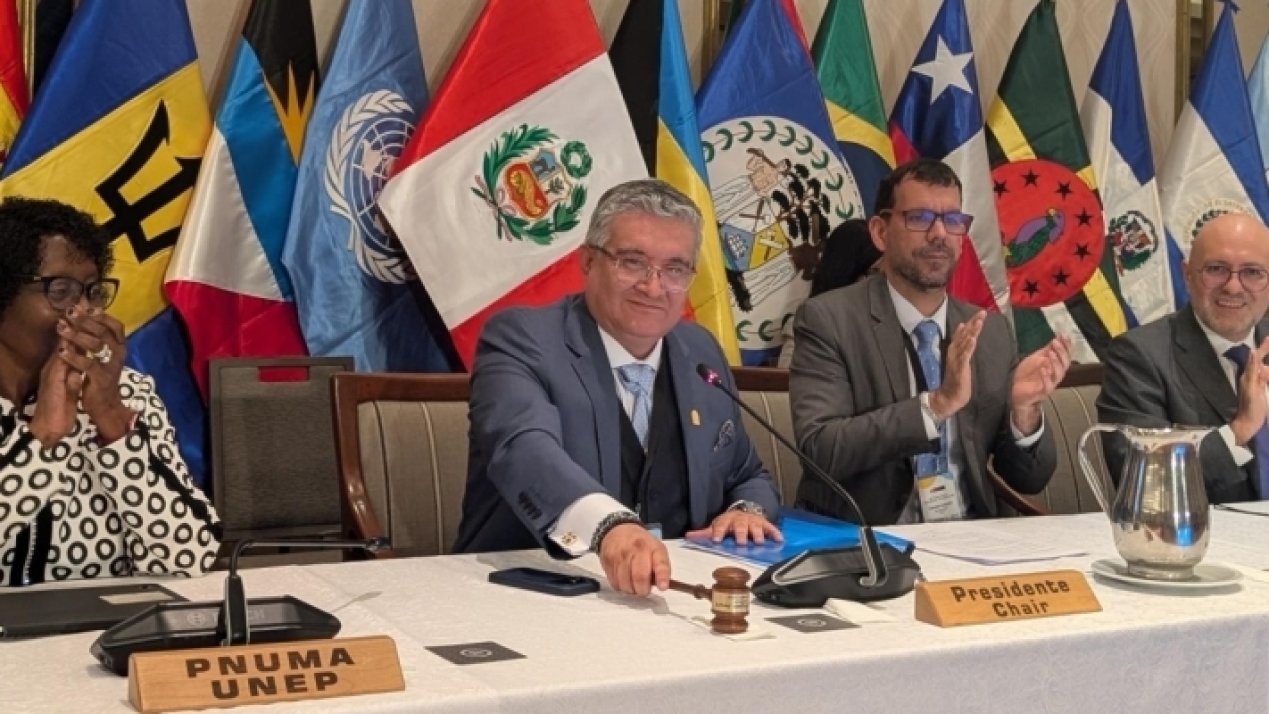Environment ministers from Latin America and the Caribbean have adopted key decisions to address the triple planetary crisis of climate change, biodiversity loss, and pollution. The XXIV Meeting of the Forum of Ministers of the Environment of Latin America and the Caribbean (LAC), held in Lima, Peru, brought together representatives from the region’s 33 countries to discuss the continent’s political position on environmental issues ahead of the UN Environment Assembly (UNEA-7) and COP30.
The meeting led to the adoption of several measures to confront the environmental crisis, including an updated Regional Action Plan on Ecosystem Restoration and Water Security, aimed at strengthening the region’s resilience to drought and desertification while generating social and economic benefits.
According to a report by the World Meteorological Organization (WMO), in 2024, the average temperature in Latin America and the Caribbean was 0.90°C above the 1991–2020 average. Notably, 2024 was the hottest year ever recorded in Central America and the Caribbean, and the hottest or second-hottest on record in Mexico and South America. As a result, wildfires in central Chile, Mexico, and Belize were fueled by drought and extreme heat waves, breaking records in many countries.
On pollution, health, and the environment, countries agreed on new initiatives, including a Methane Emission Reduction Program for the waste sector and the progressive closure of open dumps, the Regional Action Plan on Chemicals and Waste (2026–2029), the Regional Action Plan on Air Quality (2026–2029), and the strengthening of regional cooperation to tackle plastic pollution.
“We must respond effectively and synergistically to the crises of climate change, biodiversity loss, and all forms of pollution through a common agenda that allows us to define and implement a practical and concrete roadmap via multiple regional and global partnerships,” said Juan Carlos Castro, Peru’s Minister of Environment.
Ministers also reviewed the outcomes of the Second Meeting of Range States of the Jaguar, recently held in Mexico, which included the Regional Action Plan for Jaguar Conservation. The plan seeks to strengthen ecological connectivity and protect strategic ecosystems across the region, positioning the jaguar as an umbrella species for conservation and restoration efforts.
Juan Bello, Director and Regional Representative, Latin America and the Caribbean at the UN Environment Programme (UNEP), highlighted that working at the regional level with emblematic species such as the jaguar offers an opportunity for synergies across multiple agendas, including biodiversity conservation, ecosystem and landscape restoration, and climate action. “If the jaguar is healthy, it means that our ecosystems throughout Latin America, and across the 18 countries that make up its range, are well preserved,” he said.
Another central issue discussed at the summit was financing. Carlos Isaac Pérez, Deputy Minister of Strategic Affairs, Costa Rica’s Ministry of Environment and Energy, emphasized that Latin America needs to make greater progress in financing for climate change adaptation and funding for loss and damage, areas where the region’s countries are especially vulnerable. He noted that this will be a key topic of discussion at COP30 in Brazil, scheduled for December.
All initiatives discussed come together in the Lima Declaration, adopted during the meeting. The declaration contains 87 articles addressing the triple planetary crisis of climate change, biodiversity loss, and pollution. It also underscores the importance of child and youth participation in promoting sustainable consumption and production practices, as well as recognizing the contributions of Indigenous peoples, local communities, youth, women, Afro-descendant peoples, and civil society actors.
The event concluded with the handover of the forum’s presidency to Panama for the next two years. “This transition symbolizes the continuity of a collective effort in which Latin America and the Caribbean speak with one voice to urgently confront regional and global environmental challenges. We must protect our forests and rivers, our biodiversity and oceans, to ensure the clean air and pure water on which our lives depend,” said Juan Carlos Navarro, Panama’s Minister of Environment.
